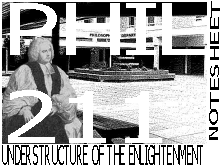 Locke 4
Locke 4 Locke 4
Locke 4General ideas are nominal essences. A general idea is (also) a sort.
"That then which general words signify is a sort of things; and each of them does that, by being a sign of an abstract idea in the mind; to which idea, as things existing are found to agree, so they come to be ranked under that name, or, which is all one, be of that sort. Whereby it is evident that the essences of the sorts ... are nothing else but these abstract ideas ... From whence it is easy to observe, that the essences of the sorts of things, and, consequently, the sorting of things, is the workmanship of the understanding that abstracts and makes those general ideas." Locke, An Essay concerning Human Understanding, Bk III, Ch. III, Section 12.
Locke: Creating sorts is therefore done by the understanding. Can the understanding set up whatever sorts it chooses?
Reprise: two senses of substance:
1. The 'thingness' of a thing: the idea you add to a a collection of ideas of sense in order to make the ida of an object.
2. The ghostly subtratum to a thing in which all a particular thing's qualities 'inhere'. (He is probably criticising this as a confused notion of substance, not subscribing to it.)
A third idea: there is something material - not a ghostly substratum - which gives rise to the qualities we perceive it to have.
'[T]he real internal, but generally (in substances) unknown constitution of things, whereon their discoverable qualities depend, may be called their [real] essence ... and in this sense we speak of the essence of particular things.' Essay, BkIII, Ch. III, Section 15.
He thinks of this constitution as the thing's corpuscular composition.
The rational person looks 'on all natural things to have a real, but unknown, constitution of their insensible parts; from which flow those sensible qualities which serve us to distinguish them one from another, according as we have occasion to rank them into sorts, under common denominations.' Essay,, KB III, Ch. III, Section 17.
The category we allocate a thing to is its 'nominal essence'. Its corpuscular constitution is its 'real essence'. Locke thinks we cannot gain any knowledge, properly so called, of the corpuscular constitution of things.
Can we build a coherent picture out of Locke's criticism of the 2nd notion of substance and this new thought that things have corpuscularian constitutions? Maybe:
Locke thinks sets of ideas of sense often go together. He thinks this suggests that out there in the physical world sets of qualities go together - a given collection of qualities occurring again and again, mayber with minor variations. And he thinks it safe to infer that this is because one and the same pattern of corpuscles occurs again and again. The corpuscles are too small to be seen and we can't find out anything for sure about them. But he doesn't rule out our forming reasonably well-founded beliefs about them.
'[I]f anyone will examine himself concerning his notion of pure substance in general, he will find he has no other idea of it at all, but only a supposition of he knows not what support of such qualities which are capable of producing simple ideas in us ...' Essay, Bk II, Ch. XXIII, Section 2.
This has been interpreted as Locke invoking the idea of 'matter', as an undifferentiated substratum, quality-less in itself, but the base in which any quality may inhere.
"Qualities thus considered in bodies are: First, such as are utterly inseparable from the body ...[namely] solidity, extension, figure, and mobility ... Secondly, such qualities which in truth are nothing in the objects themselves but powers to produce various sensations in us by their primary qualities, ie by their bulk, figure, texture, and motion of their insensible parts, as colours, sounds, tastes, etc. These I call secondary qualities." Essay,, Bk II, Ch. VIII, Section 9.
A quality is a power. It is the power a thing has to give rise to an idea in our mind. There are two sorts of qualities: primary and secondary.
A primary quality gives rise to an idea which resembles it. Secondary qualities give rise to ideas, but the ideas are not 'like' the qualities that give rise to them.
Locke speaks of the 'figure, size, texture, and motion of the minute constituent parts' of bodies as their primary qualities (Essay, Bk IV, Ch. III, Section 25.) lists them elsewhere as: "solidity, extension, figure, and mobility." (Essay, Bk II, Ch. VIII, Section 9.)
Another formulation: primary qualities are really in the bodies that have them, whereas secondary qualities are not.
VP